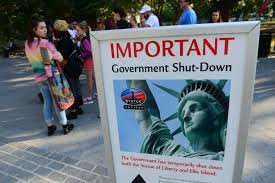Government shutdown would hurt economy

Bah humbug? If politicians in Washington don’t come to their senses and avoid a government shutdown at the end of the week, the U.S. economy could suffer a major blow right around the holidays.
That’s the warning from Beth Ann Bovino, U.S. chief economist for credit rating agency S&P Global.
In a report titled “With A U.S. Government Shutdown, Ho Ho Ho Would Become Boo-Hoo,” Bovino cautioned that failure to extend funding for government agencies by December 8 could have a significant impact on consumer spending in the coming weeks.
“As the U.S. economy begins to show signs of life and shake off the doldrums of a slow recovery, and Americans hit the mall to get their holiday spirit on as they await the much-anticipated tax reform (or cut), the timing could not be worse,” Bovino wrote.
“In particular, if a shutdown were to take place so far into the quarter, fourth-quarter GDP would not have time to bounce back, which could shake investors and consumers and, as a result, possibly snuff out any economic momentum,” she added.
President Trump has already said that a shutdown “could happen” and he was blaming Democrats for threatening to vote against a spending bill unless there are changes made to some of Trump’s controversial stances on immigration policy.
Bovino said she still thinks the odds of a shutdown happening are slim. In fact, her report Wednesday is an update from one she put out in August — before a deal was reached just after Labor Day with Democrats to keep funding going through mid-December.
Investors don’t seem overly nervous either. Stocks were flat Wednesday and remain not too far from their all-time highs.
But Bovino conceded that anything is possible in Washington these days.
“Betting the holiday budget on a rational U.S. government may be a risky proposition that leaves the cupboards bare to start 2018,” she wrote.
Related: How tax reform could hinder innovation in the U.S.
Bovino added that Trump’s rhetoric about Democrats wanting to let in more illegal immigrants could make negotiations even more difficult.
“The unthinkable has suddenly wandered into the realm of what may come to pass,” she wrote,
So how much of a hit could the economy take if there is no deal? The S&P Global team of economists estimated that a shutdown would trim at least 0.2% points, or $ 6.5 billion, from real GDP growth for each week a shutdown lasts.
Government workers will be hurt, as would private contractors who will be losing out on getting paid during a shutdown.
“Holiday vacations and school trips may be curtailed when hundreds of national parks and monuments are closed for business,” Bovino wrote. “And with the risk of fewer paychecks, some may rethink whether it’s practical to travel home for the holidays.”
But there’s a bigger issue at play as well. Any stalemate on the budget could potentially impact negotiations to raise the government’s borrowing limit, the so-called debt ceiling.
“The shutdown and the looming debt ceiling combined could significantly hurt business and consumer sentiment, as well as the overall economy,” Bovino wrote.
It gets worse.
“Government disarray may dim the afterglow that GOP lawmakers hope to bask in” if a reconciled tax bill makes it through the House and Senate and is then signed into law by Trump.
Related: Here’s what’s in the Senate tax bill — and how it differs from the House
And then there’s this dire warning.
“The impact of a default by the U.S. government on its debts would be worse than the collapse of Lehman Brothers in 2008, devastating markets and the economy,” Bovino wrote, adding that “the economy would fall back into a recession, wiping out much of the progress made by the recovery.”
The last time that the U.S. seriously flirted with a default in 2011, S&P wound up downgrading the nation’s credit rating — even though lawmakers did wind up raising the debt ceiling at the last minute.
So here’s hoping lawmakers and President Trump come to their senses and don’t wind up being the Grinch this holiday season.
